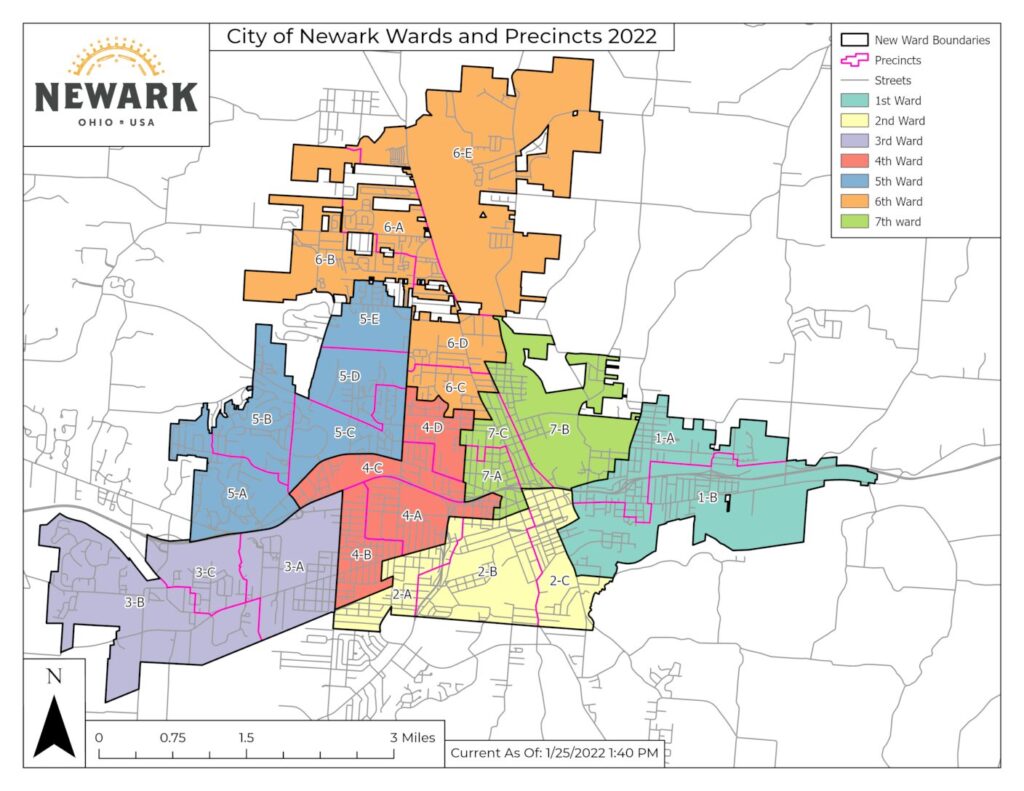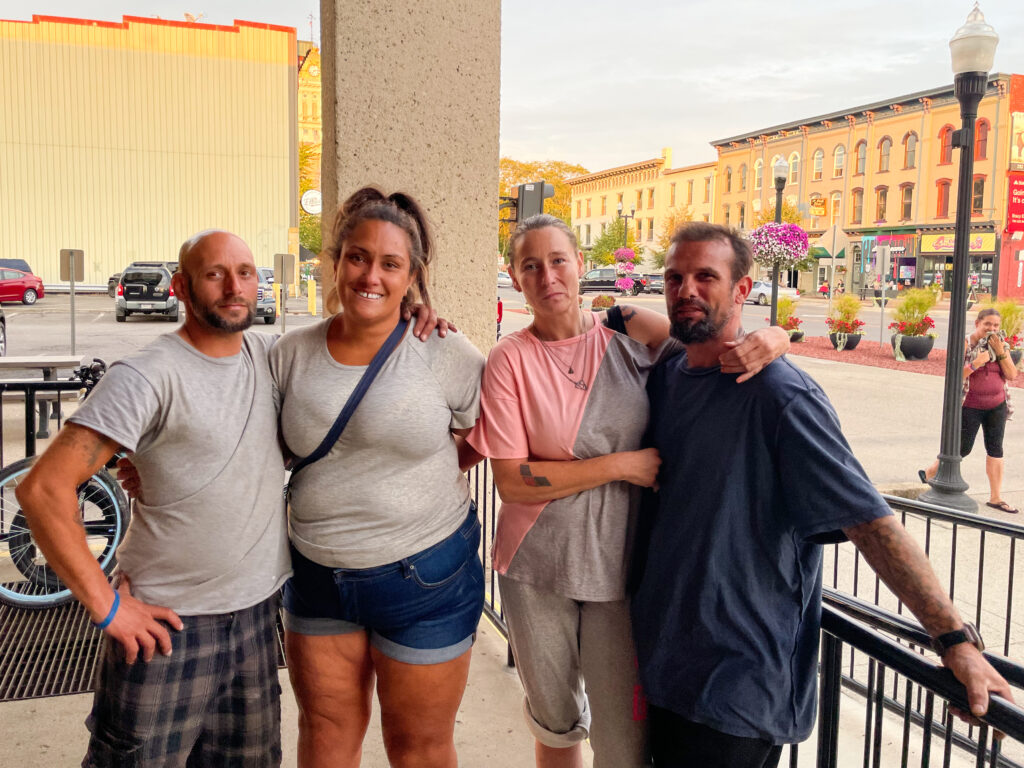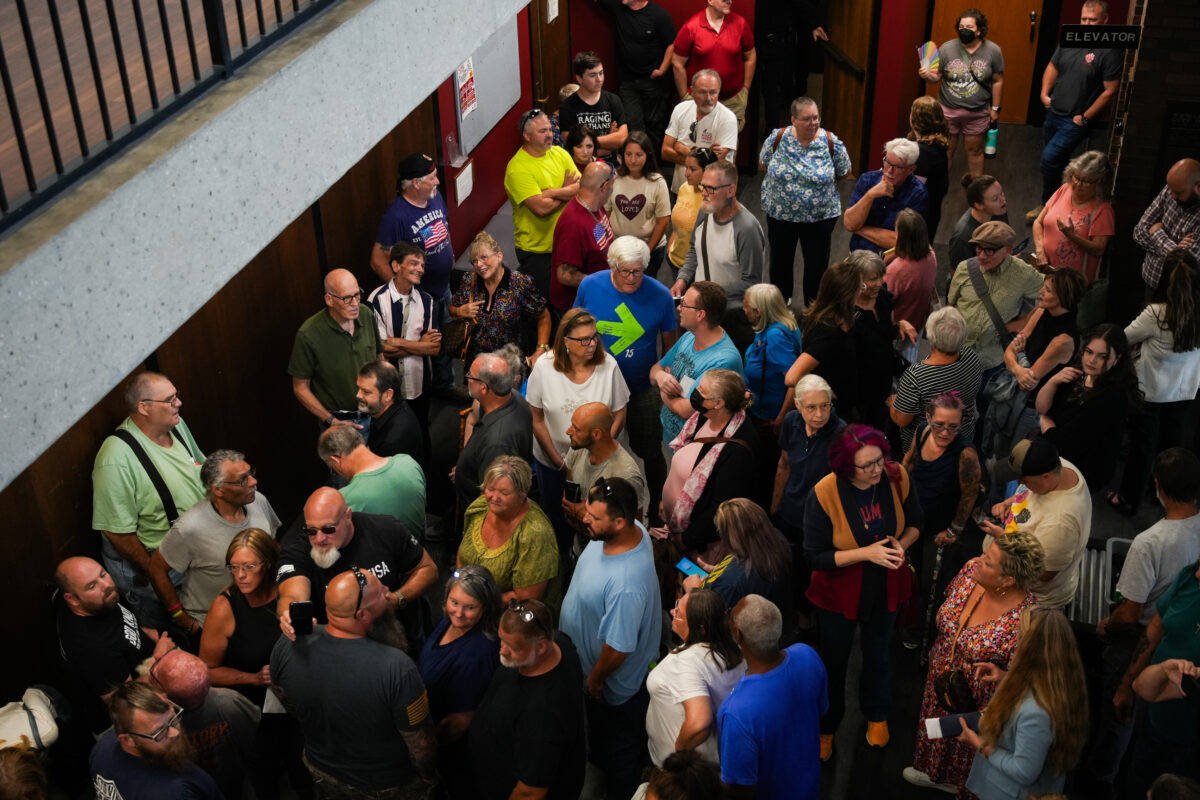The Safety Committee for the City of Newark, Ohio, has proposed misdemeanor charges against people sleeping outside on public property in Ordinance 24-36. The proposed ordinance has riled myriad citizens to speak both in support and against increasing the consequences of outdoor sleeping.
“Right here in this town, I’m gonna let it shine”
People sang along and swayed with their phones in the air, but they were not at a concert. They stood in the lobby of the Newark City Municipal Building, waiting from 5:50 p.m. to 6:09 p.m. on Monday, Sept. 16, for the Newark City Council’s executive session to end and the committee meetings to resume.
Voices singing in harmony filled the first floor and soared to the mezzanine. Though the doors in front of the dozens of singers were closed, people were happy and hopeful, singing “Amazing Grace” and “This Little Light of Mine.”
The crowd of about 100 came in response to continued discussion of Ordinance 24-36 — a proposal that would create fines and misdemeanor jail penalties for people found guilty of sleeping or camping on publicly owned land.
2024-09-16_PACKET_Safety-CommThe proposal initially discussed in front of a crowd of nearly 100 people on Tuesday, Sept. 3, brought an even bigger crowd during Monday’s committee meeting, with Newark residents voicing both support and opposition to the legislation.
So many wished to speak that the safety committee had to be tabled at 7 p.m. and resumed after the main council meeting.
How did we get here?
This proposed legislation, which the safety committee voted to move to the full council during Monday’s meeting for a reading on Oct. 7 and possible vote on Oct. 27, follows the City of Grants Pass V. Johnson Supreme Court case from June 28 this year, in which the U.S. Supreme Court upheld an Oregon city’s right to penalize outdoor sleeping, even when the offenders had nowhere else to go.
Despite Columbus, the closest major city to Newark, committing to avoid increasing criminal penalties, the smaller city is seeking further consequences. Under the proposed ordinance, a first offense of “camping” on public property could result in a fine of up to $150, and subsequent offenses could result in fines of up to $250 and up to 30 days in jail.
After the public commented, At-large Council member Bill Cost Jr. spoke, acknowledging that people do not want to see unhoused people on public or private property, but that he was putting his foot down against the ordinance.
“I wouldn’t want them in my yard, you wouldn’t want them in your yard, I get that,” Cost said. “I’m still not comfortable with option three, because I don’t think jail solves the other two problems. I think we’re better, I think we’re bigger than that.”
Council member Michael Houser, who represents Newark’s first ward, spoke next, citing the responsibility that the city holds to its business owners and private citizens.
“I definitely do support this ordinance,” Houser said. “I know it’s not a perfect solution, I know it’s not a solution to a certain extent, in that there are a lot of other things that need to be done here, but I think that this is a tool we need to give to our safety forces to keep our community safe.”
Echoing Houser’s sentiments, council member Mark Labutis — representing Newark’s fourth ward, an older part of the city just west of downtown — spoke about the city of Newark’s ability to solve the homelessness and housing crisis.

“While this solution is not perfect, we do have an intelligent, vibrant community, and we want to work together toward a solution,” Labutis said. “I feel like that might be able to happen.”
Council member Beth Bline followed. She represents the second ward, on the south side of Newark.
“The city does have a responsibility to keep its public places safe,” Bline said. “It’s not a solution for homeless[ness], and I hear the frustration in many voices, but it is a baseline in action. Because there is accountability involved in transformation.”
The following day, Bline expressed her admiration for all those who chose to attend the meeting and speak their minds.
“It’s great to see their response,” Bline said. “And honestly, there was as much online response as there was in person. So it was great to see people get involved and share their opinion.”
Some commenters raised concerns about trash left on their properties and safety issues at their homes, while others expressed consternation about the lack of recourse they have in dealing with unsheltered people in their neighborhood, on the bike path and in public areas.
Brandon Myers — who owns and operates Real Rescue Tree Experts, a company that manages environmental hazards and also hosts a ministry that targets social issues like substance abuse, homelessness and child trafficking, according to the organization’s website — told the committee that he supported the ordinance because he lives in Newark and wants to help the community.
“I have a stake in the ground in this county,” he told the committee. “If [this ordinance] will make change to where it will clean up our city, then it would be a positive thing.”
Myers told The Reporting Project that his support for the ordinance was complicated, in part because he supports fewer laws and a smaller government, and in part because he worries that this could just be another law on the books that’s not enforced.
“This is personal to me,” he explained. “My concern … is that I don’t feel we’re doing a [good] job of enforcing the laws that we have.”
Some local unhoused residents gave their thoughts on the consequences of Ordinance 24-36 as well.
“A lot of us would go to jail,” said Marilyn Tapealava, an unhoused mother living in Newark. “There’s going to be a lot of children without their parents.”


Public comments about the proposal stretched into the regular Newark City Council meeting, where Newark fifth-grader Jackson Hollis weighed in on the bill.
Hollis, who was nervous about speaking in front of the council for the first time on Monday, said that just because one person who is unhoused steals something doesn’t mean all people who are unhoused do that.
Every Wednesday, he told The Reporting Project, he volunteers with his grandmother to feed unhoused people in his community.
“Not everyone is bad,” he told the council. “You guys are stereotyping them to be bad people.”
When the safety committee reconvened after the council meeting on Monday, other commenters told the council about their own experiences with homelessness, substance use disorder and working with unsheltered people across Newark.
“I get the privilege to help those on the streets with my church,” said Renee Smith. “There absolutely is a problem. … But I do know that a lot of people that we serve don’t get high. They don’t use [drugs]. They are just hard up.”
Smith told the council she previously dealt with substance use disorder and has been clean for nearly five years.
“This may be our city trying to go in the right direction of cleaning up the streets, and I definitely applaud all the homeowners coming out,” Smith continued. “I don’t see, from an addict’s standpoint, from a mother’s standpoint, from a citizen of Newark’s standpoint, I don’t feel that this ordinance is a step in the right direction.”
What’s next?
Now that the proposed ordinance has been voted into full council, it will be read for the first time in full during the Oct. 7 council meeting. No vote will take place. The ordinance will be read a second time on Oct. 27, and the council will have an opportunity to vote on the proposal.
Noah Fishman writes for TheReportingProject.org, the nonprofit news organization of Denison University’s Journalism program, which is supported by generous donations from readers. Sign up for The Reporting Project newsletter here.

